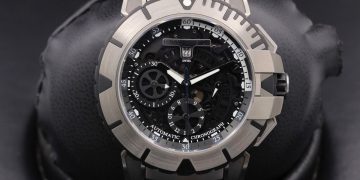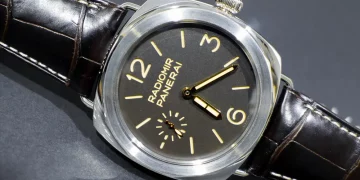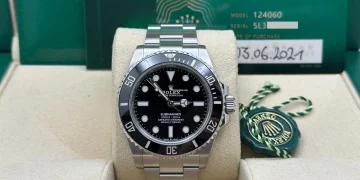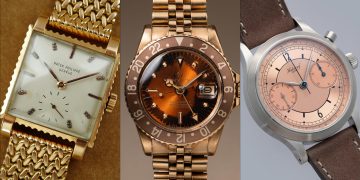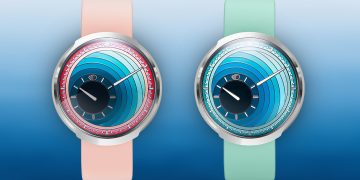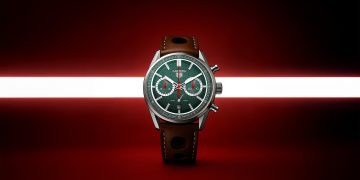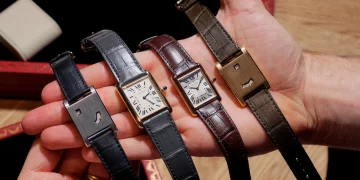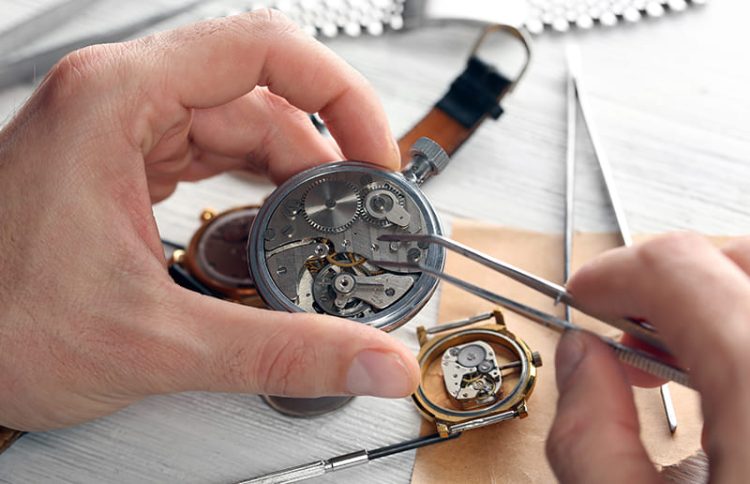A luxury watch is not only a functional tool but also a work of art, representing precision and craftsmanship. However, over time, you may notice that your watch is no longer keeping perfect time. Whether your watch is slightly off or running fast or slow, these issues can be frustrating, especially when you rely on your timepiece for daily use.
Before you rush to a repair shop, it’s important to understand that some of the causes of inaccurate timekeeping are simple and can be resolved at home with a little knowledge and care. This guide will help you troubleshoot common timekeeping issues and offer simple solutions to get your watch back on track.
1. Watch Running Fast or Slow: Common Causes
When your watch runs too fast or too slow, the issue is often linked to the mechanism inside the watch. Here’s a breakdown of the possible causes and how to address them.
Possible Causes:
- Magnetic Interference: Watches, particularly mechanical models, are sensitive to magnetic fields, which can distort the timekeeping accuracy. Everyday items like phones, computers, speakers, and even microwave ovens emit electromagnetic fields that can interfere with the internal movement.
- Temperature Fluctuations: Extreme temperature changes can affect the lubricants inside the movement, causing it to run too fast or too slow. Mechanical watches are especially sensitive to temperature, while quartz watches can also be impacted by severe heat or cold.
- Worn-out Movement Components: Over time, the internal components of your watch, such as gears and springs, can wear out or become misaligned, leading to timekeeping inaccuracies.
Simple Solutions:
- Avoid Magnetic Sources: If you suspect magnetic interference, try placing the watch near a demagnetizer (available at many watch shops), which can remove the magnetism from the movement.
- Temperature Control: Keep your watch in a stable environment, avoiding sudden changes in temperature. If you live in a location with extreme climates, consider wearing a more temperature-resistant model.
- Professional Servicing: If the issue persists, you may need to have the movement serviced to repair or replace any worn-out components. Regular servicing every 3-5 years can help prevent this.
2. Mechanical Watch Not Running or Stopping
If your mechanical watch (manual or automatic) has stopped working or is running intermittently, the issue could stem from a lack of power reserve, dirt in the movement, or insufficient winding.
Possible Causes:
- Worn-out Power Reserve: If you wear your watch infrequently, the power reserve might run out, causing it to stop.
- Lack of Movement: Automatic watches are wound by the movement of your wrist. If you haven’t worn your watch for a while, the watch may not have received enough movement to stay wound.
- Dirty Movement: Dust, dirt, or old lubricants in the movement can cause the gears to stick, which can result in stoppage or irregular timekeeping.
Simple Solutions:
- Manual Winding: For manual watches, wind the watch fully to ensure it has a full power reserve. Turn the crown clockwise for about 30-40 turns.
- Automatic Watch Winding: If you have an automatic watch, wear it daily to ensure it is properly wound. If you don’t wear it regularly, consider investing in a watch winder, which keeps your watch wound when not in use.
- Clean the Movement: If dirt or old lubricant is the issue, you will need to have your watch professionally cleaned and serviced. Watchmakers can disassemble the movement, clean it thoroughly, and lubricate the components to restore its performance.
3. Date and Time Not Changing Correctly
Many watches feature date and time functions, but sometimes they can become misaligned or fail to adjust correctly, especially when transitioning between AM and PM.
Possible Causes:
- Incorrect Date Change Timing: Many watches stop changing the date during the night, typically around 10 PM to 2 AM. If you set the time during this period, the date change function may malfunction or not engage.
- Date Adjustment Mechanism Issues: The date-change mechanism might be stuck or malfunctioning due to dirt, lack of lubrication, or overuse.
Simple Solutions:
- Avoid Adjusting Between 10 PM and 2 AM: Set the date and time when the watch is not in its date-change zone (typically outside of 10 PM and 2 AM). This prevents damaging the date-change mechanism.
- Manual Date Adjustment: If your date is misaligned, carefully adjust the date by pulling the crown to the right position and turning it. Be sure to advance the time by a few hours before adjusting the date, to avoid issues with the date-change mechanism.
- Seek Professional Repair: If the issue persists, take the watch to a qualified watchmaker for a mechanism inspection.
4. Watch is Gaining or Losing Minutes Consistently
If your watch is gaining or losing minutes regularly, the issue could be linked to magnetic fields, wear on the movement, or simply factory errors. In most cases, this is a matter of calibration or wear and tear.
Possible Causes:
- Magnetic Interference: As previously mentioned, magnetic fields can influence the accuracy of a watch.
- Old Lubricants in Mechanical Watches: Old or degraded lubricants in mechanical watches can cause friction, leading to inaccurate timekeeping.
- Misaligned Movement: Over time, the internal components can shift, leading to imprecise movement and time loss or gain.
Simple Solutions:
- De-magnetize the Watch: If you suspect the watch is magnetized, use a demagnetizer or have it professionally de-magnetized.
- Servicing: Watches that gain or lose time consistently may need to be taken in for a full service to ensure the movement is properly lubricated and adjusted. A watchmaker can also recalibrate the watch for improved accuracy.
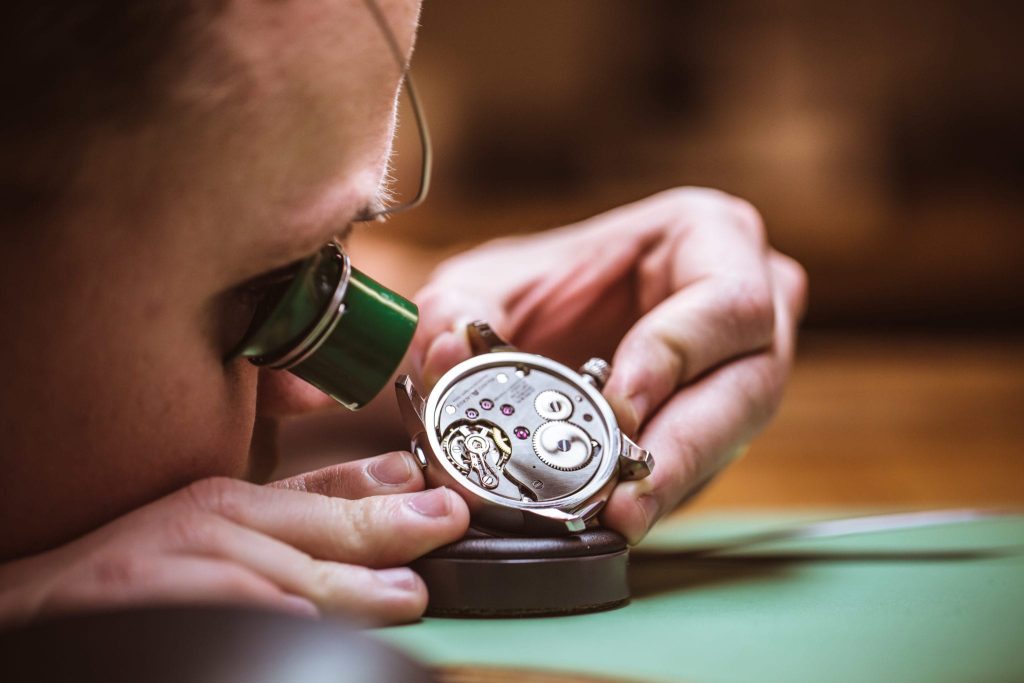
5. Quartz Watch Running Fast or Slow
While quartz watches are known for their high accuracy, they can still experience minor accuracy deviations over time due to issues like battery depletion, temperature fluctuations, or electromagnetic interference.
Possible Causes:
- Low Battery: A dying battery can cause your quartz watch to run slower, faster, or intermittently.
- Electromagnetic Interference: Electronic devices can sometimes disrupt the timekeeping of quartz movements, causing irregularities.
Simple Solutions:
- Change the Battery: If your quartz watch is running slow or fast, the first step is to replace the battery. A new battery can restore accuracy and prevent erratic behavior.
- Check for Electromagnetic Sources: Keep your quartz watch away from devices that emit strong electromagnetic fields, such as cell phones, computers, and speakers.
6. Watch Stops Working After Getting Wet
Water exposure can be especially damaging to watches if they are not water-resistant or if their seals are compromised.
Possible Causes:
- Damaged Seals: Over time, the gaskets and seals around the watch case can deteriorate, allowing water to seep inside.
- Water Resistance Failure: If the watch is not properly sealed or if it’s exposed to high-pressure water (e.g., diving), it may stop working due to moisture getting into the movement.
Simple Solutions:
- Dry the Watch Immediately: If your watch gets wet, dry it off immediately with a soft cloth. Avoid turning the crown or adjusting the watch while wet, as this could cause water to enter the movement.
- Check Water Resistance: If your watch is advertised as water-resistant, make sure the seals and gaskets are intact. Consider getting a water resistance check at a professional watch shop.
- Professional Repair: If your watch stops working after water exposure, take it to a watchmaker to check for any internal moisture damage and seal replacements.
Conclusion: Careful Maintenance Ensures Longevity and Precision
A watch that is running inaccurately can be a source of frustration, but many issues can be resolved with simple troubleshooting and regular maintenance. By understanding the causes of timekeeping problems and applying basic care techniques, you can restore your watch’s accuracy and prolong its life.
For more complex issues, especially those related to the movement, it’s always best to seek help from a professional watchmaker or service center. Regular maintenance, such as cleaning, lubrication, and battery changes, will keep your timepiece running accurately and looking great for years to come.



